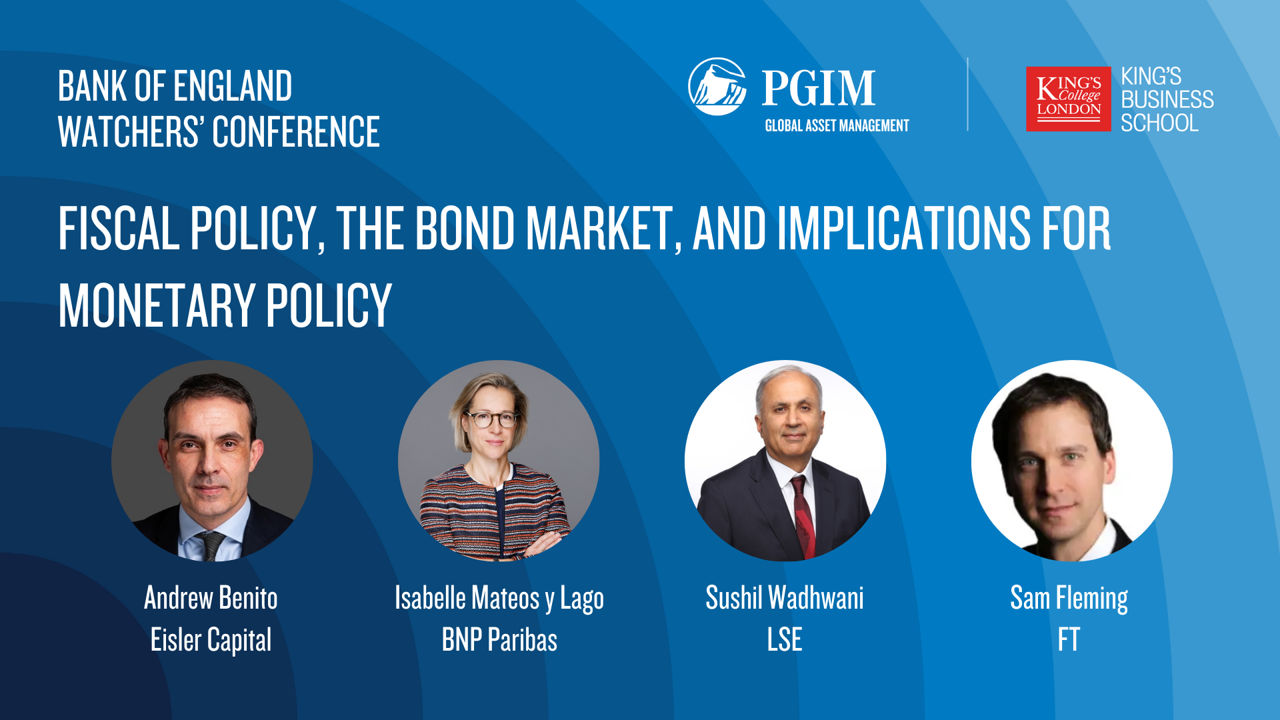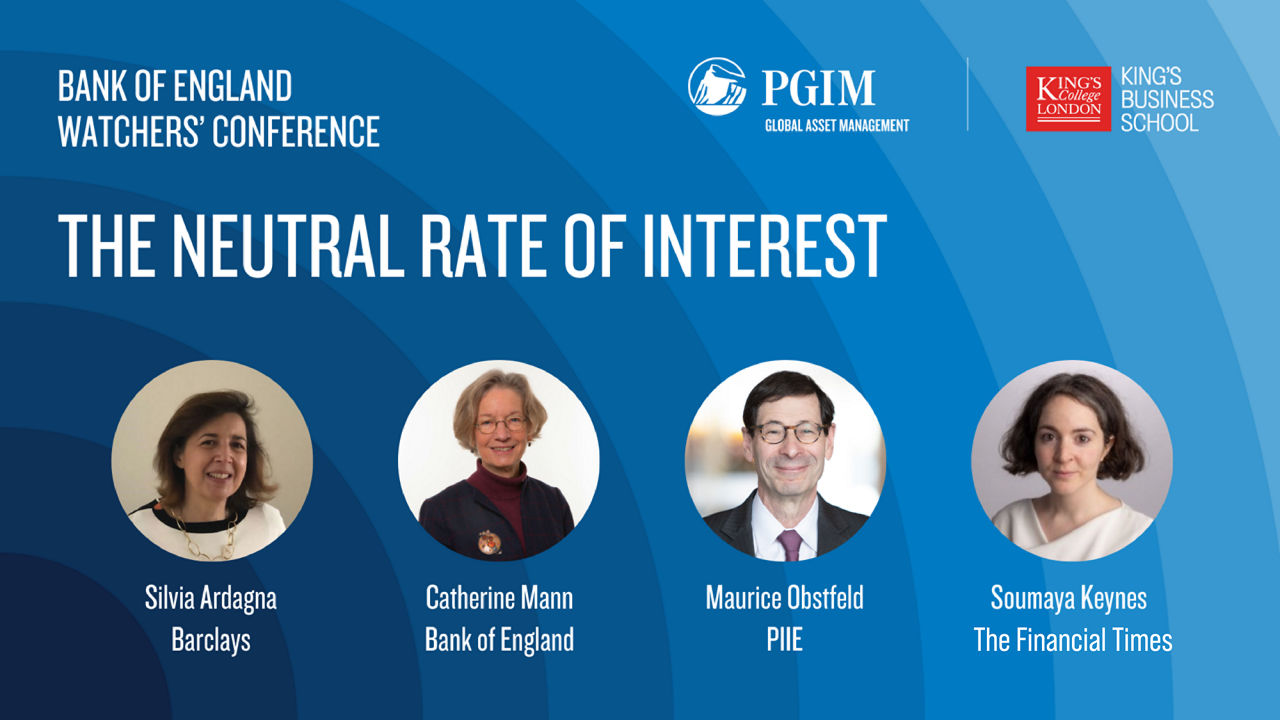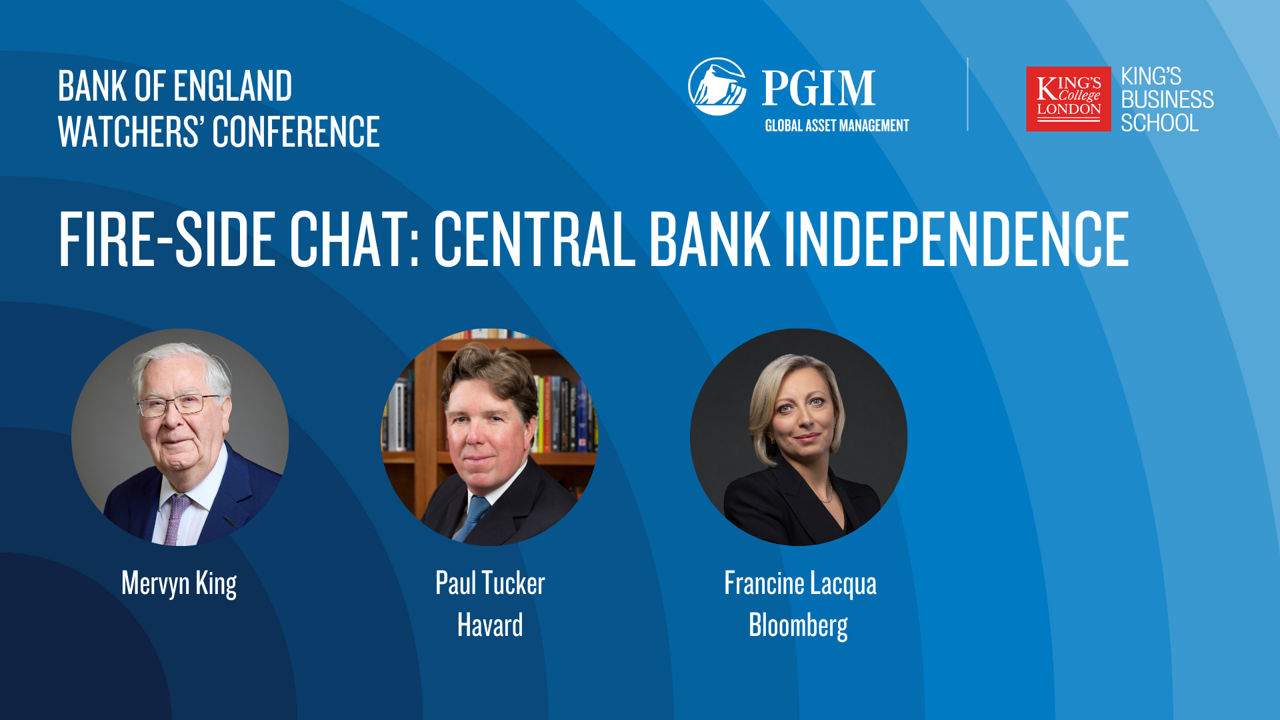The Bank of England Watchers' Conference is an annual forum that convenes a diverse network of individuals with a shared interest in the work of the Bank of England and the broader field of central banking. Now in its fourth year, King’s College London and PGIM hosted a day of rigorous discussion and nuanced debate against the backdrop of pressing global issues, from rising trade protectionism to growing concerns over central bank independence. Below, we outline the most compelling insights from the event.
-
Keynote Speech: Clare Lombardelli (Bank of England) The Bank of England is reforming its monetary policy approach to embed risks and uncertainties into its framework to consider the impact of higher tariffs and increasingly uncertain U.S. policies. Chair: Rachana Shanbhogue (The Economist)
-
Fiscal Policy, the Bond Market, and Implications for Monetary Policy Rising U.S. policy uncertainty and domestic fiscal constraints are straining the UK bond market, amplifying risk premiums. The BoE could expand its toolkit by revisiting its Quantitative Tightening program and temporarily suspend fiscal rules during times of crises. Panellists: Andrew Benito (Eisler Capital), Isabelle Mateos y Lago (BNP Paribas), Sushil Wadhwani (LSE) Chair: Sam Fleming (FT)
-
Monetary Policy Outlook Supply chain shifts and trade fragmentation may drive long-term inflation, while high inflation, wage growth, and shocks like the pandemic and energy crises hinder central banks' pre-emptive actions. Read the full summary. Panellists: Gianluca Benigno (Lausanne), Megan Greene (Bank of England), Katharine Neiss (PGIM) Chair: Phil Aldrick (Bloomberg)
-
The Neutral Rate of Interest Measuring the neutral rate of interest is complex, shaped by inflation expectations, policy rates, and global economic forces affecting national R-star estimates. Panellists: Silvia Ardagna (Barclays), Catherine Mann (Bank of England), Maurice Obstfeld (PIIE) Chair: Soumaya Keynes (FT)
-
Fire-side Chat: Central Bank Independence Central bank independence hinges on accountability, transparency, and maintaining inflation targeting as its core remit. Speakers: Mervyn King, Paul Tucker (Harvard) Chair: Francine Lacqua (Bloomberg)
-
Fire-side chat: Alan Taylor (Bank of England) and Ed Balls (King’s College London) External MPC members bring diverse expertise, fostering dynamic, independent decisions and adaptability to evolving evidence in a fast-changing economy.
Up Next
- Clare Lombardelli
- Bond Markets
- Monetary Policy Outlook
“In the longer term, if global trade were to fragment, this would reduce output and productivity and raise inflationary pressures.” Clare Lombardelli, Deputy Governor, Bank of England.
Disinflationary Momentum: Progress on disinflation remains gradual but steady. Wage growth, a central driver of inflation, is slowing, with private sector regular pay growth down from recent highs. As a result, a 25-basis-point rate cut in the latest policy outcome reflected confidence in the UK's disinflation trajectory while recognising risks of weaker demand.
Scenario Analysis: The Bank is reforming its monetary policy approach to embed risks and uncertainties more deeply into its framework. In the May policy decision, for example, the BoE considered two scenarios. The first explored the risk that demand weakened more than expected, triggering a quicker unwind of inflation. The second scenario explored the possibility of renewed second-round effects on inflation as well as supply constraints, generating a more persistent inflationary environment.
Global Trade Developments: Higher tariffs and uncertain U.S. policies are poised to dampen growth and inflation over the policy horizon, driven by reduced demand and trade diversion stemming from reduced exports to the U.S. by other nations. Recent exchange rate movements further reinforce the likelihood of lower imported inflation in the UK. Over the long term, the fragmentation of global trade would suppress output and productivity, while exacerbating inflationary pressures.
“If you put that whole combination of factors together, it seems to me not unreasonable that on a three to five year view, there is a significant risk that the U.S. term premium expands meaningfully.” Sushil Wadhwani, Former Member, Monetary Policy Committee, Bank of England.
Sushil Wadhwani: The growing uncertainty in the U.S. bond market due to attacks on Federal Reserve independence, fiscal instability, and diminishing security guarantees are forcing market participants to increasingly question U.S. Treasuries as a safe-haven asset. These factors could lead to significant term premium expansion and dollar depreciation.
The BoE could take a bolder stance by addressing unwarranted increases in gilt yields, which unnecessarily tighten financial conditions, especially as events like threats to Fed independence in the U.S. have limited relevance to the UK. Adjusting its Quantitative Tightening programme could provide a crucial tool to address unwarranted movements in gilt yields, complement conventional monetary tools and enhance market stability.
Andrew Benito: There is a growing risk of "fiscal fatigue" in the UK, where political limits to tax rises and spending cuts hinder further efforts to stabilise debt-to-GDP levels. This fiscal pressure complicates policy decisions for the Bank of England by exacerbating risk premium episodes, which disrupt monetary transmission and economic stability.
By establishing a credible record within the existing fiscal rules framework, the BoE can facilitate smoother policy transmission of measured rate cuts aimed at supporting demand. This approach would underscore that policy easing is being implemented for appropriate reasons while preserving greater flexibility for potential future balance sheet interventions.
Isabelle Mateos y Lago: Annual inflation target reviews by the government and fiscal constraints introduce reflexivity and volatility into market pricing of interest rates. Unlike its peers, the UK’s framework creates perceptions of lesser central bank independence. Examples include swift moves to shrink the Bank's government debt holdings and high inflation-linked debt issuance, which amplify risk premiums.
Episodes like the January market reaction, where yields in the UK surged due to fiscal rule constraints, underscore the rigidity and amplification of these pressures during periods of economic strain. By comparison, Europe’s temporary suspension of fiscal rules during crises has shown that such constraints are not always necessary to maintain fiscal responsibility.
“It doesn't seem completely crazy to think that this inflation volatility could be with us for quite some time, making the job of the central bank difficult and a challenge to central bank credibility.” Katharine Neiss, Chief European Economist, PGIM Fixed Income
Megan Greene warned that some inflation indicators remain persistently high. She highlighted concerns around a near-term hump in inflation, amplified by heightened household sensitivity due to recent inflation shocks. Upward trend in short- and medium-term inflation expectations, which sit toward the upper band, also warrant vigilance.
She also warned that supply-side issues present ongoing risks to inflation sustainability. Factors like supply chain reorganisation and trade fragmentation were noted as potential inflationary pressures in the longer term.
Katharine Neiss noted that high inflation and nominal wage growth, coupled with recent shocks such as COVID and energy crises, have made it difficult for major central banks to act pre-emptively. Secondly, inflation volatility has increased markedly compared to prior periods. She attributed some of this variability to supply chain disruptions, geopolitical shocks, and climate events affecting energy and food prices.
She stressed that such volatility complicates the task of separating domestic inflation signals from short-term shocks, undermining central bank credibility. Finally, she suggested that delayed central bank responses might lead to more aggressive monetary actions, such as larger rate hikes or cuts over shorter periods. This could, in turn, impact balance sheet strategies, requiring more cyclical QE and QT interventions.
Gianluca Benigno offered a complementary perspective on monetary policy, with a focus on its cost implications and the significant role of housing inflation. He highlighted the persistence of the housing component within UK inflation, which constitutes nearly 20% of the consumer basket and has been driven up recently due to the impact of interest rates being passed through to tenants.
He also discussed the dual role of wages, not just as an inflationary input but as a driver of demand. Real wages in the UK are only just reaching their pre-financial crisis peaks, pointing to their role in supporting aggregate demand. He also advocated for more decisive rate cuts to address cost pressures and balance demand concerns.
- The neutral rate of interest
- Central bank independence
- Alan Taylor and Ed Balls
“It is very important to take from financial markets and businesses, and households what they observe in terms of their degree of restrictiveness. I look at the outcome of monetary policy stance as it is transmitted through financial markets.” Catherine Mann, Member, Monetary Policy Committee, Bank of England
Catherine Mann outlined the complexity surrounding the neutral rate of interest or the ‘R-Star.’ She highlighted the challenges in measuring the real rate gap, influenced by factors like inflation expectations and policy rate estimations. These variables are uncertain due to their reliance on distribution analysis rather than averages, which fail to capture risk and volatility effectively.
She warned of the risks of underestimating real R-star, clarifying its influence on supply-demand equilibrium and long-term market outcomes. She argued that greater attention to uncertainty, volatility, and risk premiums is vital for assessing degrees of restrictiveness and managing spillovers. Robust evaluation of real rate gaps, nominal rate gaps, and inflation expectations is critical to informing monetary policy strategies under fluctuating conditions.
Maurice Obstfeld noted that even in domestic-centric monetary policy frameworks, global economic integration means international forces inevitably influence national R-star estimates. An example lies in the interconnectedness of global financial markets, as evidenced by the growing foreign asset holdings of countries.
While industrial countries exhibited declining real interest rates, emerging markets faced persistent upward pressures since the global financial crisis. He noted that changes in global fiscal policies and geopolitical drivers like defence spending and AI-related infrastructure investments may push R-star higher in the future.
Silvia Ardagna spoke about the long-term determinants of R-star. She noted the pronounced ageing trend in Europe as one of the key downward drivers of neutral interest rates. She explained that this demographic decline creates economic drag, which could only be mitigated by a substantial bounce in productivity. However, even with a significant rebound, this would only partially counterbalance demographic effects in the eurozone.
While the US and UK are better positioned due to less severe demographic pressures, she warned that maintaining neutral rates at their current levels would require consistent productivity gains. Additionally, Silvia discussed the supply of safe assets, highlighting the role of US Treasuries in influencing R-star trends.
“I cannot think of an institution that is more accountable every single day than the central bank. Accountability is about having to explain why you took the decision that you did. The central bank should be disciplined in its communication by clearly explaining the decisions that it has taken.” Mervyn King, Governor, Bank of England 2003 - 2013
Mervyn King highlighted how the 1970s and 1980s saw unsuccessful monetary policies and high inflation leading to the creation of independence for the Bank of England in 1997. He argued for banking supervision and lender-of-last-resort functions to remain within the Bank of England to manage crises effectively.
King emphasised that central bank independence relies on accountability and transparency. He clarified that the inflation target must remain the Bank’s primary remit to ensure focused public accountability. He advocated for decision-making clarity and technical debates where necessary but stressed the need to maintain stringent separation from political influence.
Paul Tucker: He underscored the unique governance of the Monetary Policy Committee (MPC). He emphasised its "one person, one vote" structure, contrasting it with the European Central Bank's chair-led system.
He argued this approach fosters independence of thought and decision-making, enabling members to act without undue influence from senior figures like governors. Using examples from peers like the U.S. Federal Reserve, he praised leaders who strategically deflected political pressure, such as former Chair Paul Volcker. He advocated for restoring a stronger culture of scrutiny around inflation risks.
“If you are waiting for all the hard data to confirm every inflation component, then you are going to be behind the curve, and that is going to come with its own cost. So, there are risks to reading forward-looking data, but you cannot ignore it.” Alan Taylor, External Member, Monetary Policy Committee, Bank of England
Alan Taylor highlighted the critical role of external members in the MPC, emphasising how their diverse expertise contributes to more dynamic and independent decision-making. He stressed the importance of being adaptable and willing to take activist positions, based on emerging evidence and the rapidly shifting economic landscape.
Drawing on his background as an economic historian, Alan emphasised how studying long-term trends and global crises provides invaluable lessons for policymaking. He demonstrated the importance of not falling into the trap of "recency bias" by using a broader historical perspective to understand economic cycles, financial instability, and the impact of global trade dynamics.
-
Regulatory Reforms For Insurers Offer OpportunitiesRegulatory changes across the UK and the European Union are opening new opportunities for insurers.
Read More
-
The Five Forces of The Old NormalFive structural forces are reshaping the global economy as the ‘Old Normal’ returns.
Read More
-
Five Takeaways from COP30The outcomes of COP30 reveal a new climate reality – fragmented governance, adaptation focus, and persistent funding gaps.
Read More










